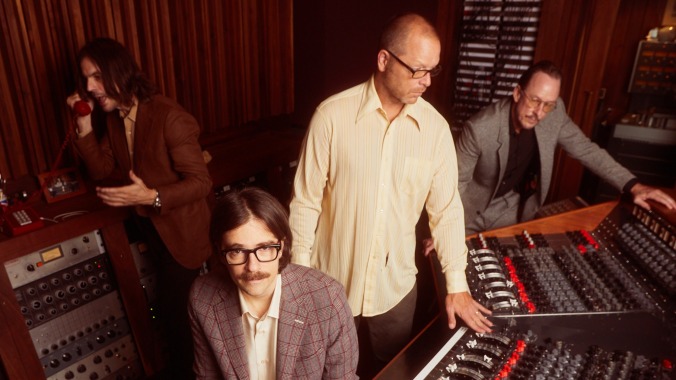With OK Human, Weezer dresses up its pop in retro-’70s clothing

It was supposed to be the year of Van Weezer. After putting out a dozen studio albums (13 if you count the all-covers Teal Album), Weezer had planned to release Rivers Cuomo’s homage to the metal music of his youth in 2020. Instead, COVID-19 happened, and Cuomo did what many of us have done over the past year: turned inward and looked for ways to pass the time. Unusually for the artist, he’s left a pretty open-book recording of that process, albeit one with new window dressing adorning his usual pop-rock nuggets. There are no shredding guitars to be found on OK Human; instead, Weezer has looked past the ’80s to the early ’70s and the heyday of the orchestral pop album.
Of course, this being Weezer, there’s not exactly a profound shift in songwriting, so much as a substitution of a 38-piece orchestra for the guitars and synths of records past. Instead of distorted riffs, there are strings—fierce, muted, and pizzicato in equal measure—providing the melodies that drive these songs. There’s a stately restraint to most of the music. A few upbeat numbers attempt to quicken the pulse (“Grapes Of Wrath” is a standard-issue Weezer single), but the album’s overriding mood is one of thoughtful reflection. It’s a vibe that suits Cuomo and company; this many albums into its career, Weezer could stand to take a step back, take stock, and reorient itself along a wavelength less beholden to the earworm wannabe-hits that have come to exemplify the band’s sound at this point.
As much as it may be borne of COVID-based necessity, this record is a logical progression. Those who gave a close listen to 2019’s The Black Album heard an antecedent of this sound, what with its general lack of punchy rock and emphasis on acoustic guitar, piano, and gently processed arrangements. (Even better, there are none of that record’s misbegotten attempts at rapping and dance-R&B jams.) There’s always been a forlorn singer-songwriter side to Cuomo, even at his most trend-chasing nadirs, and by embracing the retro sounds that inspired that aspect of his writing, the musician has found a happy medium between his radio-friendly aspirations and the throwback pleasures that have stayed hidden beneath the band’s too-polished 21st-century sheen.
It’s evident in the album opener and lead single, “All My Favorite Songs,” which fuses a traditional Cuomo vocal pattern and melody to Beach Boys harmonies, simple Harry Nilsson-style string arrangements (the press materials for OK Human name-check both acts for a reason), and lyrics that straddle the line between evocative and overwrought without going too far in either direction. It’s solid, in other words—which isn’t damning with faint praise, rather affirming that Weezer is nailing this material.
It’s in the slower, more balladry-driven songs that OK Human (the latest in a long line of stupid reference-heavy album titles, this time nodding at Radiohead’s classic) finds its openly beating heart. The lilting beauty of “Numbers” is an ode to humans’ innate ability to find ourselves lacking in comparison to others, which nonetheless finds salvation in companionship. (“I hear the sadness in your laughter” is as good a refrain lodestone as Cuomo’s penned in years.) “Playing My Piano” is the singer at his most nerdily vulnerable, testifying to the healing power of the title instrument, which transcends even the calls of loved ones. And “Dead Roses” is the rare instance of Cuomo allowing his voice a bit of fragile quaver, stripping away the studio bells and whistles (at least, until the vocal doubling comes in) to provide raw and unvarnished lyrical storytelling paired with some genuinely impressive orchestral arrangements that suggest how good he could be, if only he truly jettisoned the easy familiarity of his comfort zone for something more daring.
The whole project provokes a Sliding Doors-like moment of consideration for what could have been: Rivers Cuomo as songwriter and producer, rather than normcore pop star. His songcraft and gift for melody have always outstripped his vocal talents, and some of these tracks are nothing if not reminders that his own merely adequate voice may not be suited to the expansive pop he’s crafted here, more a Brill Building mastermind than a Nilsson- or Wilson-like talent for delivering his own work himself. Listening to OK Human, it’s clear that had he chosen to go that direction, the musician could well have found himself penning classic hits for every would-be pop singer under the sun, a Jack Antonoff-like Svengali for those with powerhouse pipes and a need for artistic shepherding. (After hearing this record, the mind boggles to consider the potential greatness of, say, a Katy Perry album co-written and produced by Cuomo. “Roar” is practically a latter-day Weezer song, when you think about it.)
Still, when he doesn’t get in his own way with an overabundance of verbiage and references, Cuomo delivers commanding orchestral pop music—with a minimum of fuss. OK Human clocks in at barely half an hour, its dozen songs including a one minute-plus, refrain-only anthem (“Mirror Image”) and a 24-second keyboard palate cleanser leading into “Here Comes The Rain,” one of the most unabashedly sunny ditties the band has ever laid down. A great piano riff leads into a thumping kick drum, followed by a rich upbeat melody, like the start to a happy ’70s movie. “Here comes the rain / It’s gonna wash all my troubles away.” Hoary and clichéd, yes, but it works; this is the melding of SoundCloud bedroom pop and adult contemporary at its semi-finest. OK Human likely won’t convert any new followers, save for maybe a few fans of the same old-school muses Cuomo is aping. But it should remind Weezer’s doggedly loyal fanbase that the singer’s ear for melodicism remains second to none—and when the musical accompaniment rises to meet the challenge, as it often does here, it’s a testament to why we keep coming back.